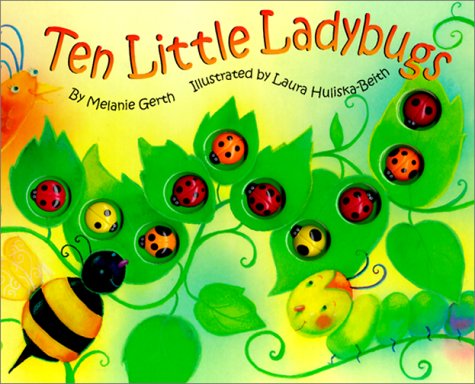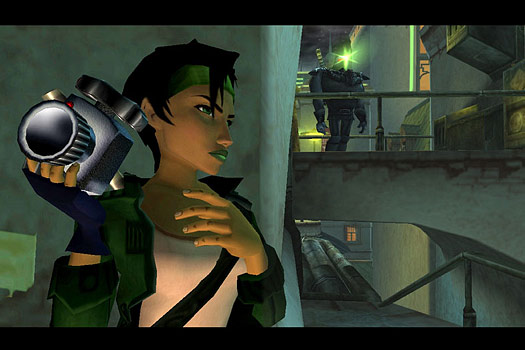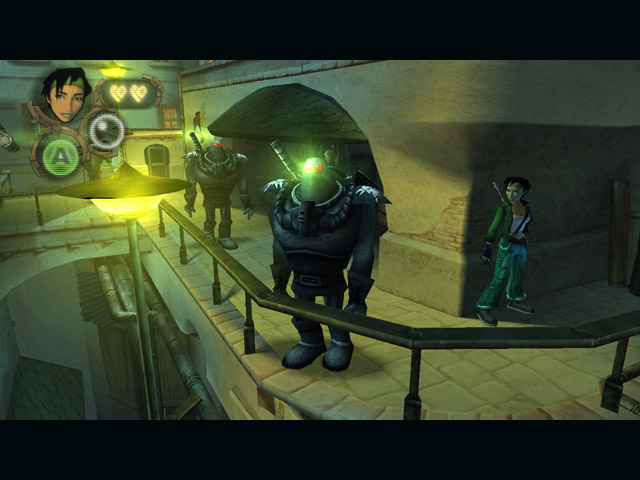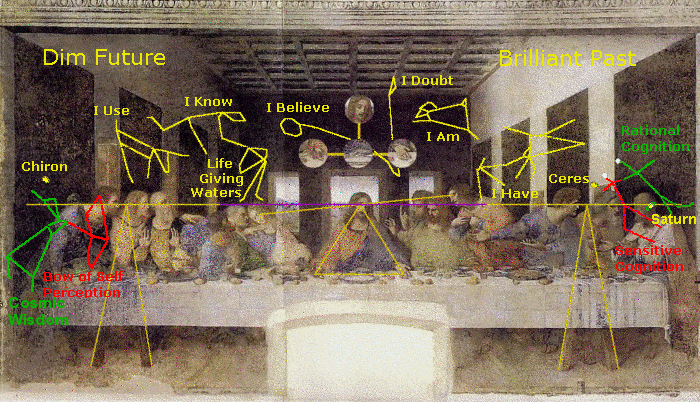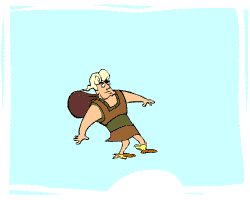April 30, 2004
 Ten Little Ladybugs
Ten Little Ladybugs
by peterbA gothic tale of kidnapping, murder, cannibalism, and mayhem in the insect kingdom, Ten Little Ladybugs, written by Melanie Gerth and illustrated by Laura Huliska-Beith, presents a troubling view of the devastating havoc that eschatological idolatry and ideology wreak on America's children. That such potentially scarring material is promoted as a "children's book" is even more troubling.
The cover is gaily festooned with the pastoral scene from a bourgeois garden, the smiles on the faces of the predatory insects arrayed around the ladybugs designed to mislead even the most cynical reader. The ladybugs themselves are given special treatment, being plastic appliques which can be touched by the unwitting child-victim. This pre-literate tactile contact enhances the bond between the reader and the helpless meals-ready-to-eat. As the pages are turned, and the ladybugs are devoured one by one, the appliques disappear one at a time as well, leaving only holes in the book (and in the soul and heart of the toddler holding it).
Once the reader is lured to begin the book, there is no respite. It begins with an almost Tarantinoesque shock of bloody violence:
Ten little ladybugs, sitting on a vine.
Along came a butterfly, then there were....
and when the reader turns the page, of course, they will find the word "nine," and the first of the harmless ladybugs has been consumed by the innocently smiling butterfly. The phrasing of the poem, an homage to Agatha Christie's classic suspense thriller Ten Little Indians, is both calculated and cruel. As in that grim, humourless work, there is no detective come to save the day here; no Pea weevil Poirot to stop the slaughter and accuse the guilty. All there is here is death, senseless and brutal.
Nine little ladybugs, skipping on a gate
Along came a caterpiller, then there were eight.
The innocence of the ladybugs is maintained throughout the narrative. It is more than mere unwariness -- even as they move towards their stomach-acid drenched doom, the author relentlessly describes them as "skipping," "dancing," trying to force the reader into accepting the (nonsensical) idea that the ladybugs have accepted, even welcomed joyously, being rent asunder in this fashion. The analogy to Leni Riefenstahl's Tag der Freiheit, which likewise disguised the horrors of the Nazi regime by focusing on the smiling, fresh faces of German soldiers, could not be more clear. Of course the caterpilllar is healthy and strong -- he is nourished by the flesh of those he oppresses.
I will not excerpt the entire book here -- enough harm has been done by Gerth and Huliska-Beith, and I do not want to continue the madness -- but their message is corrupt and corrupting: "No one is innocent." A bee, a turtle, a duck, even animals that are not insectivorous take part in the macabre ladybug buffet.
I was ready to write this off as merely another piece of "shock" fiction, when I reached the chilling conclusion that demonstrated the devious (and subtle) ideology behind the tract:
One little ladybug, sitting all alone
Along came a breeze, and then she was...home.
The symbology here is powerful and insidious. By employing the very elements themseves to deliver the coup de grace, Gerth disclaims responsibility and absolves the guilty of their crimes. "That's the way the world really works," she seems to be saying. "Get used to it, kids. Eat or be eaten." Such a message, while dispiriting, might be acceptable in a book targeted at an older audience (Orwell's "a boot stomping on a human face...forever" comes to mind), since it could be viewed as a cautionary tale. Here, targeted at toddlers, it is merely mean-spirited.
In the final page, depicting all the ladybugs "safe and sound" in the afterlife, happily cavorting with their various tormentors, you can hear the authors' cruel, mocking laughter echoing through the page. It chilled me to the very bone.
Ten Little Ladybugs is readily available to children at your local bookstore, and also at amazon.com.
Next week: The feast of Atreus and Miss Spider's Tea Party.
April 28, 2004
 And the Ass Saw the Angel
And the Ass Saw the Angel
by peterbOne of the more egregiously out of print books, in America at least, is Nick Cave's And the Ass Saw the Angel. Elise introduced me to this book ages ago, lending me a copy of her precious (Imported! British! Naked lady on the cover!) paperback.
It's written in an approximation of how Cave, a Australian gothic heroin chic musician, thinks an illiterate retarded Southern anti-Elvis educated at Eton might write:
A single naked bulb hung from the ceiling directly over mah crib. The bulb throbbed hotly, brazen and hypnotic, as ah lay upon mah back and observed, with increasing annoyance, a growing number of night-insects serried around the humming cynosure. Ah watched helplessly as every minute or so an over-zealous moth or gnat or fly would collide with the deadly bulb, frying to ash its little wings and hair-like appendages in the doing. Thus its futile business would end in a screaming descent, invariably coming to ground within the fruit-crate in which ah lay. Spinning insectile amputees littered mah crib -- died ghastly deaths, their last agonies performed in all their screaming luridess right before mah eyes, to bring them at last to the end of their days, bereft of life -- stone cold dead.
That's the style, and if you can't handle the jarring inconsistency of "ah" and "mah" sandwiched next to "cynosure," you won't get very far in this book, and I can't blame you. But, look, if We can Cut Thomas Pynchon Slack for Writing a Novel wherein he Capitalized every Noun and Seemingly Other Random Words for Over One-Thousand Pages, surely we can give Cave a "get out of pretentious prison free" card for this, his first novel.
And the Ass Saw the Angel takes the point of view of the bestial, filthy mongrel Euchrid Eucrow, despised by all and cared about by none, and chronicles his obsession with the beatific, beloved, and disturbingly-named girl Cosey Mo. Cave's obsessions with the American South's poverty culture, Elvis, biblical retribution, religious fanaticism, and redemption are all on display here. I can quibble about Cave's inability to remember that we call them "trucks" in the American South, not "lorries," but that's really beside the point: the intensity of his obsession with these Southern hypergothic archetypes is on display here, and the uniqueness of his voice can't be denied.
Of course, if obsession was all it took to make a good novel, there would be a lot more good novels. Pity the poor Southerner: Faulkner tried to capture their voice accurately, showing them in all their flawed, human glory. Fifty years later we have books like the execrable Vernon God Little winning the Booker prize with the incisive observations that most Americans in Texas are fat, eat lots of junk food, and can't spell the word "fucking" (Dear Rest of the World: look, if there's one word pretty much every American can spell, that's the one, OK? Apparently the London literati must still be bitter about Renée Zellweger's British accent in Bridget Jones' Diary, and giving Vernon God Little the Booker was their revenge.) With this in mind, the problem with And the Ass Saw the Angel is that one can't escape the fact that it was written by an outsider, and while its voice is unique, it is not authentic. In trying to express his obsession with his fictional, Biblically significant Gomorrah-of-the-psyche, Cave does some violence to it. Violence other than that which he intended, I mean.
So it's a conundrum. It doesn't ruin the book, but it does suggest a lost opportunity to me. It's easy to lose yourself in the Otherness of a foreign culture, but familiarity or love for the Other doesn't necessarily help us write in their voice. In trying to do so, you can not only create a voice which rings false (as in Vernon God Little) but also weaken your own ability to connect the reader to the impulse that you're trying to express. Cave's obsession with and search for redemption would exist even if he had never heard of America. How much power, how much truth, how much reflection was lost or obscured because of the voice he chose for the novel? Somewhere in Victoria, Australia, many years ago, a young man grew up feeling outcast and despised. As he grew, he began to turn those feelings into art. I know it's a mistake to conflate an author with his characters -- particularly when the tale is in the form of a fable, as it is here -- but these themes run so solidly through everything Cave has ever done that I think I'm on safe ground doing it. I would like to hear that boy's story in Cave's own native accent, in his own idiom, rather than in a fake Southern patois.
Much to my surprise, I discovered there is now a spoken word album with some "experimental" music ("experimental" is Australian for "bad") and readings from the book by Cave. There are samples at Amazon, but if you're looking for a soundtrack to this book you're probably better off listening to his album The Firstborn Is Dead.
Additional Resources
Ah do declare that mah pillocks grow all ossified like the stinking, feculent ravens that shit and mewl in the junkyard, pecking at the scabs that cover mah bruised and broken body, when ah think you maht click on these links:
- A biography of Nick Cave. The official biography from his web site
- Elise at pocketskeleton is definitely Cosey Mo to the Interweb.
- You can typically find used copies of the book at Amazon. Keep it away from the children, OK?
- The spoken word album
- The Firstborn is Dead
April 27, 2004
 Simple pleasures
Simple pleasures
by peterbTwo eggs
1 - 2 teaspoons soy sauce
generous squirt of sriracha chili sauce (a.k.a. "rooster sauce")
dash sesame oil
scramble in skillet with a little canola oil
Enjoy with tea.
April 23, 2004
 Beyond Good and Evil
Beyond Good and Evil
by peterbCurrently on the bargain racks for the Xbox, GameCube, PS2, and PC platforms is a little gem of a platformer: Beyond Good and Evil. It was released with some fanfare late last year, and proceeded to impress critics and fail to sell at all. The fact that this game (essentially) flopped makes me a little sad. I am not certain if it is a sign that the publisher, Ubisoft, is an incompetent marketer (as a friend of mine said, "Beyond Good and Evil? They might as well have named it Marcus Aurelius's Meditations") or a sign that the game playing public is, by and large, composed of morons. Given that the somewhat inferior (but "branded") Prince of Persia handily outsold Beyond Good and Evil, and that the latest abysmal Need for Speed driving game outsold Project Gotham Racing 2, I lean towards the latter hypothesis.
I might like this game first and foremost because of its style. It has a lot of style to spare.
Beyond Good and Evil tells a formulaic story ("Save the world. And your friends. Win valuable cash prizes! Oh look, a plot twist."), but it tells it very well. You are Jade, a nearly broke freelance reporter who lives in a beautifully decorated lighthouse on the planet Hillys with a bunch of adorable orphaned street urchins. Well, OK, lighthouse urchins. Hillys is bombarded daily by the appropriately insectois DomZ (hereinafter "bad guys," since their name violates my capitalization ethics), and is defended by the oddly incompetent yet ominous military organization called the Alpha Section (think Buzz Lightyear with stormtrooper helmets). Jade gets a mysterious job offer, one thing leads to another and...well, I don't want to spoil the plot. It really is very professionally produced, and I found myself staying up to unreasonable hours more than once to see what would happen next. "Just five more minutes," I'd say, and another hour would roll by.A large part of the game is using your camera (you're a reporter and a photographer) to take pictures of unique animals, enemies, and activities relevant to the plot. This might be the first game I've played with "camera view" controls that didn't have me cursing in frustration (the incredibly, disgustingly awful Fatal Frame just about gave me an aneurysm). The camera controls are crisp, responsive, and sensible. It's also nice that this gives you a motivation beyond "go in and beat people up" (although combat does, of course, become inevitable).
The game's mechanics match my tastes perfectly. I called it a platformer, earlier, but that's not quite right. The nearest comparison would be to The Legend of Zelda, with a little bit of Metal Gear Solid thrown in. In other words, the challenging part of the game is figuring out the right way to approach an obstacle (be it a blocked entryway or enemy guards), rather than using your joystick virtuosity to get past them. There's some degree of dexterity involved (particularly in the obligatory pod hovercraft races), but the difficulty is always manageable. In every case where I got stuck, it was because I wasn't thinking about the problem correctly, rather than because I wasn't nimble enough.The sound design, art, and music direction are very good; Hillys, although small, is consistently realized and depicted, with a sensibility drawn from a somewhat jarring yet amusing mixture of different contemporary Japanese anime styles (I think of it as Ghost in the Shell meets Pokemon). It works, somehow. The voice acting, with the notable exception of the near-racist stereotype hispanic computer, was excellent. The one negative comment I have is that the game falls on the stupid side of the "save points vs. save anytime" divide in that it uses save points, but they got enough other things right that I'll forgive them that one bogosity.
It's a good game. I hope the team that worked on it sticks together for more projects.
So if you, like me, bought Prince of Persia this past holiday season and were disappointed by its boring, repetetive gameplay and high difficulty level, then I suggest you do like I did: sell Prince of Persia to EB Games (or to some friend you don't like very much) for $15, and then buy Beyond Good and Evil for $17. It'll be $2 very well spent.
April 22, 2004
 Blood and Treasure
Blood and Treasure
by peterb
Why this picture? Why now? Mostly because of this woman who was fired for sharing a picture like it.
Photo courtesy of The Memory Hole and the Freedom of Information Act. Link courtesy John Scalzi.
April 20, 2004
 Children's Books vs. Video Games
Children's Books vs. Video Games
by peterb33. If You Give a Mouse a Glock 19 [peterb]
32. Duck on a Warthog [peterb]
31. Horton Hears a Sniper [agroce]
30. Cat In A Hat With An M-16 [jch]
29. The Cat In The Hat Talks Smack [peterb]
28. The Little Castle Wolfestein on the Prairie. [tmwong]
27. Green eggs and fireballs. [bhudson]
26. Goodnight, Moon Patrol [peterb]
25. The Little Rocket Launcher Who Could [tomault]
24. Little Red Jedi Knight [bhudson]
23. Put a Cap in Pop [rochberg]
22. Grandma, Felix, and Mustapha Tactical Nuke [agroce]
21. One Fish, Two Fish, Red vs. Blue Fish [peterb]
20. Splinter Cell: Puppy Helmet [agroce]
19. Go, Link, Go [peterb]
18. Click-clack, Doom [peterb]
17. Alexander and the Terrible, Horrible, No Good, Very Bad NAZI HORDE [agroce]
16. American McGee's _The Velveteen Rabbit_ [agroce]
15. Clifford the Big Red Faction [peterb]
14. George and Martha Rematch [rochberg]
13. Charlotte's Web Hunt [rochberg]
12. Charlie and the Chocolate Shotgun [peterb]
11. The Hoboken Chicken Shootout [rochberg]
10. James and Princess Peach [peterb]
9. How Tommy Vercelli Stole Christmas [peterb]
8. Twisted Metal Black Beauty [peterb]
7. The Adventures of Winnie the Pooh, Opposing Force: Book of the Year Edition [peterb]
6. Are You There, God? It's Me, That Guy From Quake. [peterb]
5. Sarah, Plain, Tall and with a Wicked Headshot [tomault]
4. The RPG of the Swan [tomault]
3. Alan Mendelsohn's Pro Skater [rochberg]
2. Medal of Honor: Briar Patch [rochberg]
1. Beyond Good and Evil My Little Ponies [baird]
Additional Resources
If you liked this, you'll also like:
- Topbot, dutiful recorder of top-N lists.
- The icon for the "Games" category was lifted from Penny Arcade, one of the best webcomics around. I dropped them a line and asked them to not sue me and let me know if it bugged them. So far, they haven't. Also, the "Splinter Cell: Puppy Helmet" entry came from one of their strips.
April 19, 2004
 Fnord!
Fnord!
by peterbLast night I read The Da Vinci Code (detailed review forthcoming). Tonight while idly wanting to see some of the paintings the author describes, I stumbled on this kook's site:
The best part is that that diagram is the sanest thing on the page. The text is a hundred times worse.
I always assumed that Robert Anton Wilson was joking or exaggerating about conspiracy theorists' ability to see echoes of their delusions in anything and everything. Bad assumption.
April 18, 2004
 President Forever
President Forever
by peterbAs a followup to my preview of The Political Machine, I decided to try President Forever, which was suggested by one of my alert readers (who, I believe, is involved with the publisher?) There is a free demo available, and the full game can be purchased and downloaded for a mere $12. I paid more than that for lunch this week. (They also will sell you, as a bonus, their previous game President 2000 for just $2. I bought it, because I'm a sucker for a bargain, but I haven't tried that one yet.)
President Forever is a Windows-only game. (Question for game publishers out there: why aren't you developing all your games in SDL? Then you'd get great graphics and sound and everything could be trivially ported to Windows, Mac OS X, Linux, and probably other platforms. This isn't a rhetorical question -- I really want to know.)
A word before we continue: I'm going to compare President Forever to The Political Machine a lot in this review. I think this is reasonable, since they both address the same topic. That being said, please remember that the version of The Political Machine I've played is just a beta, and for all I know they're going to completely change it before it's official release.
Let's start with the positives. I had fun playing both the demo and the full game (warning: the demo doesn't let you complete a full election, so if you're desperate to see George Bush lose to someone, be prepared for disappointment). The game takes a more strategic, higher-level view of the US Presidential Election than The Political Machine. Yes, there's the same aspect of "run your candidate around the country and make speeches and fundraise" that existed in TPM, but those are inadequate to win an election by themselves.
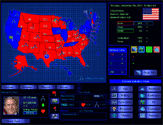
President Forever
Why would you ever change your theme? Well, issues wax and wane in importance over time. Stump speeches on military intervention are going to be more important in 2004 (for example), then will speeches on, say, affirmative action, because the issue is hotter.
There's also electoral strategy, which gives you a bird's-eye view of what states you are trying to win in order to put together 270 electoral votes. This sounds obvious, but isn't, and the implementation of strategy is fairly nice, because it lets you enact broad decisions like "run this ad in all of the states in which I'm marginal that are part of my strategy." Electoral strategy also influences where your crusaders go. More on crusaders below.
Whereas The Poltiical Machine makes candidate stamina the central currency, here the primary currency is "command points," a renewable (you get 6 each turn) non-bankable resource. There are also "political points," a nonrenewable resource (you get 10: when you use them all, they're gone) that can be used to help win endorsements. Your candidate does have a "fatigue" meter, and when it gets low he becomes less effective and is more likely to commit a gaffe. The only way to recover from fatigue is to rest. There is also, of course, cash.
You won't have enough command points to do everything you want to do, which is as it should be. There's a few things you can spend command points on that span multiple turns. For example, you can hire foot soldiers or crusaders. Recruiting a crusader takes 1 command point over 10 turns; once you start, you've lost that command point for good until the recruiting is done. Once a crusader is "hired" (as John Kerry, my first crusader was Theresa Heinz-Kerry -- jeez, can't I even get my wife to campaign for me easier than that?), they hit the campaign trail, barnstorming and making speeches on the themes you've chosen. They decide where to go based on what states are in your electoral strategy. This compares pretty favorably to the implementation of specialists in The Political Machine beta, where I found I was constantly shuffling them around from state to state trying to optimize the benefit I got from them. I like that crusaders in President Forever are basically autonomous -- you set the strategy, and they go try to implement it.
Public polling in President Forever is inaccurate. If you want to see accurate numbers, you need to commission a private poll, which costs cash. That's pretty cool. It's unclear to me what the effect of not having cash is; as John Kerry I ran out of money three days before the election, but apart from newspaper headlines saying "Kerry campaign is bankrupt!" there didn't seem to be any effect -- my megaexpensive advertising blitz, for example, seemed to continue as usual.
One other fascinating aspect is that at the beginning of each turn, you see the stories the newspapers are going to report. You then have a chance to spend CPs to "spin" the stories your way. I'm assured that the effect of spin is very important, but I couldn't quite see the connection in my game. I like the idea a lot, but the implementation needs work (for example, you spend your CPs but don't find out whether it "worked" until the next turn. That may be realistic, but it's confusing.)
My criticisms of the game are fairly minimal. First off, there's much less graphical flash than The Political Machine, but given the nature of the game, I didn't really mind that. The graphics were functional, if characterless, and got the point across. While I liked that the game runs in a window (dear game developers: please make it at least optional for all games to run in a window? Pretty please? It's not 1985 any more) it has a weird non-Windows feel to it -- there aren't any pulldown menus. So it feels like a bit of a hack job. This doesn't impact playability, it just goes to the fit and finish aspect of things.
I don't know whether to add bonus style points or deduct plagiarism points for the fact that one of their "menu selection" sound effects seems to have been lifted wholesale from X-Com: UFO Defense. Maybe it's a stock footage sound that they licensed. All I know is that it's probably a bad tactical move for any game to remind me that I could be playing X-Com instead.
The manual is pretty sparse, and the in-game help doesn't exist. My first time starting up the game I sat for a good two minutes staring at a bunch of hand-rolled buttons with gnostic words on them like "FS" and said to myself "Well, what the heck do I do now?" There's a ton of room for improvement in this area; a tutorial mode would work wonders. Even as an experienced player of a given game, I still rely on popup tooltips and in-game help to remind me of mechanics and strategy. There's no excuse for any game more sophisticated than, say, a driving game to not provide that sort of help. (Well, OK, frankly "The game only costs $12" is actually a pretty good excuse, in that kielbasa-sandwich-at-Chiodo's sort of way.)
The game models the candidates' debates but in such a cursory and forgetful way that it might as well not. You have to spend CP to prepare for debates, and the newspapers report whether you won or lost, but there is no actual debate drama or detail beyond "So and so won." That's a real missed opportunity.
The actual election-night coverage is utterly and didactically anti-climactic. Wait until the appointed time for the state's returns, hear who won. Yawn. Didn't any of these people play President Elect? What about precincts reporting in little by little? What about states that appear to be leaning one way suddenly becoming too close to call, or flipping the other? These things happen in real life and that's why watching election night coverage in real life is compelling. Election games should be at least as compelling as TV.
On the whole, I think this game is great value for money -- I bought it -- and the core gameplay is fun and compelling. To hotpot software, publishers of President Forever: more and better in-game documentation, please, and work a little more on the presentation issues. You've obviously done a lot of hard work to create a gem of a political election game here. It doesn't make any sense to hand a gem to the customer in a ratty paper bag.
Additional Resources
Please feel free to contact me with any corrections or further information (or pointers to more election games!).
- My review of The Political Machine.
- You can download a demo of President Forever, or buy it online. Yay, e-commerce!
- Before you could get good beer in Pittsburgh, you could get good beer in Pittsburgh at Chiodo's Tavern. Their kielbasa sandwiches are extremely inexpensive.
April 16, 2004
 New Addiction
New Addiction
by peterbThe only MMORPG (Massively Multiplayer Online Role Playing Game) that is any fun: The Kingdom of Loathing. And it's free!
I blame Zarf.
April 15, 2004
 Dawn Comes Early, With Rosy Fingers
Dawn Comes Early, With Rosy Fingers
by peterbIt has been a long time since I've experienced a web site that filled me with such elation and glee as does Winged Sandals, a Shockwaveriffic introduction to Greek mythology for kids. It has really enjoyable, accessible movies that everyone can enjoy, some neat activities (I like the trading cards), and a wonderful searchable "Who's Who," which while not comprehensive is well designed. The art style is Samurai Jack meets Pocketskeleton. The load times are substantial, but worth the wait: do the Flash version if you can.
I am, as it were, a mythology geek, and love diving in to the legends, tales, and fables of just about any culture. There is something exciting to me about reading fables and myths; the archetypes that underlie consciousness are distilled and pickled in myths, and they can take your breath away when you taste them. True, a superb author, such as Italo Calvino or Gabriel Garcia-Marquez, can channel those archetypes to create a novel story that nonetheless feels like it came from the deepest recesses of cultural memory. But there are only so many Salman Rushdies (or J. K. Rowlings) in the world, and so I return to the oldest tales whenever the mood strikes me, which is often.
I have a special place in my heart for Greek mythology. The ancient Greeks were such a venal, corrupt people that they can't help but be interesting; they wear their sins on their Gods' sleeves. No sombre procession of order brought out of chaos here; the history of the Gods and Titans is, from the outset, filled with cannibalism, rape, murder, thievery, jealousy, pillaging, boasting, cowardice, and getting completely hideously smashed on cheap wine. It's like one long action sequence.
So yeah, you can read your copy of Bullfinch's Mythology or Frazier's The Golden Bough, or listen to Joseph Campbell drone on in Bill Moyer's ear about the mythic journey of the Hero with a Thousand Faces yadda yadda fertility rite yadda yadda sacrifice yadda yadda zzzzzzzzzzzzz, or you can just visit Winged Sandals and poke around and have fun. Maybe you'll even learn something you didn't know before. I certainly didn't know about the "goat ritual," for example.
The Internet is, of course, a mythology geek's paradise, and Winged Sandals isn't the only (or the most comprehensive) site one will find. But it is one of the most engaging, I think, for someone who hasn't already developed a love of the subject. And that's worth something. Probably the closest analogue I've found is the superb (and slightly more comprehensive) MythWeb, which has excellent little animations by Mark Fiore. There are other resources too, but I won't laundry list them: I'd rather you chose a responsible guide and followed him or her down the path they recommend. I recommend Winged Sandals.Oh, one more thing: whatever you do, once you start your journey, don't look back.
Additional Resources
Links to sites discussed in this article, and more:
- Winged Sandals requires Shockwave Flash. It's worth it. (Like you haven't already installed it for Homestar Runner).
- MythWeb is great too, especially thanks to Mark Fiore's animations. Be sure to check out their illustrated version of The Odyssey.
- Some other resources for the Greek Geek: greekmythology.com is accessible and bright. Theoi.com is intended to be more encyclopedic, and is, but at the cost of being somewhat dry. It has a pretty nice family tree, though.
- Pantheon.org is a useful resource that covers many mythologies, not just Greek. Although it's invaluable as a jumping-off point (they're very good about having links to source material), their very comprehensiveness can be overwhelming; a little more attention to presenting a limited selection (and providing reasonable links to the guides they do have) would go a long way here.
- Elise Soroka of pocketskeleton is an artist.
- Why not learn Ancient Greek? Or, if you hate life, Latin?
- If you want to be my special friend, buy me this genealogical chart of Greek myth. It's only $75!
- If you catch the bug and need real, actual books on your shelf, I suggest the old standbys: Bullfinch's Mythology, Frazer's The Golden Bough, and Robert Graves' Greek Gods and Heroes. There are also many modern fictional reinterpretations and explicit retellings of Greek myth (not counting O Brother, Where Art Thou?). That subject is big enough to deserve it's own article, but I'll put a good word in here for Mary Renault's books, specifically The King Must Die, the beginning of her take on the Theseus legends.
- And, just because, you should also get Italo Calvino's Italian Folktales. (Also, everything else he's ever written, ever.)
April 14, 2004
 The Political Machine
The Political Machine
by peterbI renewed my drengin.net subscription today, specifically so I could get access to the beta test of Brad Wardell's still-in-development election game The Political Machine.
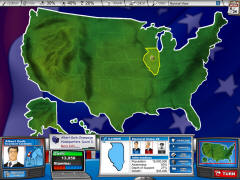
The Political Machine
I approached this game with a little trepidation, since I've recently discovered that Brad's politics are a little on the fringe. Well, let's be honest: in my opinion, he's a right-wing kook. My biggest fear was that this stridency would translate into the game as bias. So the big news from my corner is: no need to worry. Candidates are free to take any position; positions have effects on Democrats, Republicans, and Independents. And if I disagree with some of the particular choices that Brad made (if you think all Democrats oppose gun control -- or, for that matter, the war in Iraq -- you need to get out more), they're all at least good-faith arguable as caricatures, which is probably the most we can expect from an election game. More to the point, those choices are balanced in game terms. It's clear that whatever political beliefs Brad has take a back seat to his design sensibilities. That's a good thing. There are also facilities not yet implemented but clearly on-the-way to edit the attributes associated with each candidate. This is good, because even if Mr. Wardell gets things "wrong" (according to my personal biases), I'll be able to fix them. Lastly, there's a facility that I haven't tried yet for setting up a "fantasy scenario" where states don't have their real-world leanings (you could make a Massachusetts that was strongly Republican, for example).
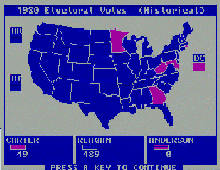
President Elect 1988
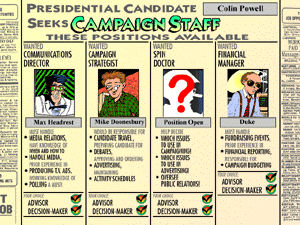
Doonesbury Election Game
The core aspect of the game is: you have 41 weeks (turns) before the election. There are two primary resources: money, and stamina. Money buys advertising campaigns and campaign headquarters which increase your name recognition. Your candidate has so many points of stamina he can spend each week; stamina can be spent earning political capital ("back room deals"), giving speeches on the campaign trail, flying from state to state, or, most importantly, fundraising. Political capital is a secondary resource which can be spent to buy campaign aides (consultants, spin doctors, the guys that broke Nancy Kerrigan's kneecaps) or political endorsements. It's the balance between fundraising and the other activities that seems to be the key mechanic in the game. Spend too much time fundraising and your message doesn't get out and, paradoxically, there will be less money available to you. Spend not enough time fundraising and you'll find yourself stranded in Indiana, unable to even afford plane fare.
Trust me. You don't want to get stranded in Indiana.
One aspect of the game that I'm looking forward to improving is the availability of more candidates. One of my favorite activities in President Elect was running fantasy candidates against Ronald Reagan and seeing what happened. I was pretty much never able to come up with a major politician that President Elect didn't already have modeled. That impressed me. It's a steeper hill for The Political Machine since they have spiffy cartoon caricatures of their candidates, so there's an art cost associated with including more of them that the earlier games didn't have to bear. But I hope they do add as many as they can, anyway.
I have not tried the networked multiplayer game yet. I'm looking forward to it, though.
In a lot of ways The Political Machine feels like a mini-scenario for The Corporate Machine. That's meant to be a compliment, not a criticism. Behind the flash of the interface I see some of the same Risk-like proximity effects going on. As the game nears completion it will be fun to discover more ways in which it diverges from its elder sibling. Cheers to Brad (and to Stardock) for keeping the flame of small, independently produced games burning.
Additional Resources
All politics is retail:
- You can obtain The Political Machine by subscribing to Drengin.net. It's for the Windows platform. Subscribing to Drengin also gets you some neat other games, like Galactic Civilizations and The Corporate Machine. Now if we can just convince Stardock to join the OS X tidal wave...
- If you'd like to play President Elect, you can. As always, I prefer the Apple ][ versions, either 1984 or 1988
- A nice overview of The Doonesbury Election Game.
April 13, 2004
 Quick U.S. Political Update
Quick U.S. Political Update
by peterbOur President is still painfully stupid.
April 12, 2004
 Gabba Gabba One of Us
Gabba Gabba One of Us
by peterbI finally stopped resisting and bought an iPod, the 15 gigabyte model.
Although I was probably doomed to buy the "regular" iPod rather than the Mini, simply because Minis are not readily available enough to satisfy my desire for immediate consumer gratification, I did actually go use a Mini before making the choice.
A lot of people talk about the superior controls of the Mini; coming to both of them cold, I thoroughly disagree. While the position of the controls on the Mini might be superior -- I couldn't say for sure without using it for a few days -- the feel isn't quite as nice, to my taste. The buttons and scroll wheel on the bigger iPod are outlined with ridges (I almost said "are ribbed for your pleasure") so that it's easy to locate the control you're looking for without looking. If the Mini has any similar tactile cue, it was too subtle for me to notice. Also, just from handling the two of them side by side, the wheel on the mini didn't connect as well to the on screen cues. I'm being vague there, but it's hard to describe. I was able to use the bigger iPod wheel perfectly, but with the Mini I kept overshooting my target. That could simply be because I have big hands.
After a couple of days with the 15 gigabyte iPod I've come to the conclusion that 4 Gb is plenty of space. It turns out I really don't listen to my entire collection of MP3s -- about 40 days worth -- in any one session. It is nice being able to have an extra complete backup of the archive, though, so I don't exactly regret having the space.
For me, the difference in size between the Mini and the standard iPod wasn't great enough to convince me to go small, but I can surely see how that would matter to a lot of folks. For me the problem with the iPod isn't its size, but the mere fact that it is a separate device at all. My problem is that I generally have barely enough brain power to remember to pick up exactly one portable device when I leave the house; it turns out that that is almost always the cell phone. This is, basically, why I stopped using my Palm Pilot -- a personal information manager that is never with you isn't much use. I'm less worried about the iPod since (for me) it's basically for working out, and just needs to be kept with the rest of the gym stuff.
I'll be first in line for the combination iPod/Pilot/GPS/Phone, though, once they're cheap enough to give them away at McDonald's.
April 10, 2004
 Tokaji
Tokaji
by peterbA brief followup Toronto booze report: I've always "liked" Tokaji, but never been crazy-go-nuts over it. In Toronto I picked up the 1999 Hétszóló Tokaji Aszú ("3"), and I love it. Although it has the sweetness you expect from a pourriture noble wine, like Sauternes, it is balanced not just by a peppery bite, but by actual saltiness. It's refreshingly tart, with an unripe apricot ester-like aroma. I've never tasted a wine quite like it. It's better by itself than with food. I'm going to buy a bunch more the next time I head up north (road trip, anyone?)
Needless to say, the infinitely stupid Pennsylvania State Liquor stores don't stock this wine, although they have the "5" and "6" versions (much sweeter) of the same house.
I still think that I prefer port, in the abstract, to Tokaji. Although I'd probably turn to Tokaji ahead of Sauternes, when in the mood for a noble rot wine, I'd still rather have the Pourriture produced by the practically unheard of Fattoria di Petreto in Tuscany. My supply of the '94, though, has run out. Calamity!
Why do I like good dessert wines so much? I think wine critic Jancis Robinson nails it when she says:
Poor-quality sweet wines are indeed pretty disgusting, their sweetness running to flab and stickiness. But good sweet wines refresh the palate, leaving it stimulated by their whistle-clean combination of natural grape sugar, lively fruity acidity and, often, the densely vegetal flavours of botrytis, the so-called noble rot, a mould that expensively concentrates the sugar and acid in grapes affected by it, dramatically reducing the quantity of wine produced but equally dramatically increasing its quality and potential longevity.
There are those who say that Monbazillac is an undervalued alternative to Sauternes. Don't believe them. Monbazillac is undrinkable swill, not even fit for the pigs of Bergerac. I've apologized to sinks when pouring bottles of Monbazillac down them. (Perhaps I am being unfair to an entire appellation based on three or four bad experiences. I'm OK with that.)
Additional Resources
In case you haven't noticed, I like dessert wines.
- What is Tokaji?
- There are a few online sources I've found for Fattoria di Petreto Pourriture Nobile. Buy me some.
- Jancis Robinson claims that Monbazillac is improving. I will remain skeptical until someone else buys a bottle and offers me a taste that is actually drinkable.
April 09, 2004
 On Jews and Jewishness
On Jews and Jewishness
by peterbShould you, perchance, use a particular popular internet utility to look for information on "jews," the most prominently displayed entry turns out to be somewhat, let us say, antisemitic. That doesn't strike me as the most useful introduction to a topic. I think the wikipedia entry on the Jewish religion is somewhat more informative and less inflammatory, as is the amusingly named jewfaq entry on who is a jew?
April 08, 2004
 Dramatis Personae
Dramatis Personae
by peterb'"Help him. Help him" Dobbs sobbed. "Help him"
"Help who? Help who?" called Yossarian once he could wrestle his headset back into the intercom. "Help who?"
"The bombadier. The bombadier. Help the bombadier"
"I'm the bombadier" Yossarian yelled right back to him. "I'm the bombadier, I'm all right, I'm all right."
"Then help him, help him" Dobbs begged. "Help him. Help the bombadier."
And Snowden lay dying in the back.
--Joseph Heller, Catch-22
It's a silly little thing, really. Just a tradition. When I crew my first bomber in the classic SSI Apple ][ game Fifty Mission Crush, I name the crew members after characters from Catch-22. The pilot will be Orr or McWatt, Snowden is the tailgunner, Aarfy is the radioman, and of course the bombadier has to be Yossarian. Various other minor characters from the book fill out the other positions.
This leads to a problem, of course, when you take heavy flak over Lille and Aarfy (for example) dies. Who takes his place? You could of course hypothesize that Aarfy Junior joined the service also, or that Aarfy has a clone, suitably named "Aarfy 2," but that somehow isn't quite as satisfying. Consequently, I tend to get attached to the first generation of each crewman, perhaps mostly because it's such a pain to come up with a new name if they die.
So like a sense of place, a sense of personality can increase a player's engagement in a game. Personality can come from the game's designers, who deliberately create personality through character and plot design, or cut scenes, as in The Mark of Kri, or in the worst case personality can be provided in the accompanying manual (How can you tell I'm old? I remember when games came with printed manuals, and the size and quality of the manual was considered to be a good indicator of the quality of the game. How naive we were then). The problem here is that not all game designers are good storytellers, by which I mean "most game designers are not good storytellers." So if you provide a character that is stupid, you lose (look at the universally negative reaction Kojima got to the "twist" in the middle of Metal Gear Solid 2. People didn't like the character, and that translated to "people didn't like that part of the game.")
The other route is for the designer to allow the player to define the personality of the character; this is the route that most American-style role playing games take (but not their Japanese cousins). It's a riskier strategy. If it pays off, then the player has an extremely immersive experience and feels empowered (you'll hear people raving about Morrowind, for example, because it "lets them be whatever they want to be.") But the flip side of "empowered" is "directionless." Since the player will get out of a game like this what they put into it, to a casual player (say, one that is just evaluating the game to see if they like it) this type of game will seem bland. Without personality.
The third path is to try to allow for the player to decide in what directions their character or characters develop, and to provide scripted personality development accordingly. The downside of this is that you're multiplying the amount of work you need to do, because you need to provide personality and narrative along several axes. Bioware and Black Isle have both done this with a few of their games. The only one where I thought they really pulled it off was in the superb Planescape: Torment, although Fallout came close.
There's a belief that is rampant among developers that writing well is easy. It's not. Telling a good story is harder than developing a complex piece of software. So I think where I come down on this from a design perspective is: if you aren't positive that you (or someone you collaborate with) can write a good story and tell it well, punt. Give the user some way to customize the character and invest her own chosen personality in her avatar, and get the hell out of her way.
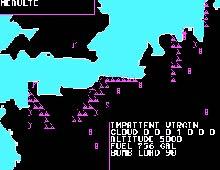
Fifty Mission Crush
It has no plot to speak of, but 20 years later, I'm still playing Fifty Mission Crush. I'm still trying to keep Yossarian alive.
"I'm cold," Snowden said. "I'm cold."
"There, there," said Yossarian. "There, there." He pulled the rip cord of Snowden's parachute and covered his body with the white nylon sheets.
"I'm cold."
"There, there."
Additional Resources
Ou sont les neigedens d'antan?
- You can obtain a DOS version of Fifty Mission Crush from The Underdogs
- The manual for Fifty Mission Crush
- If you have an Apple ][ emulator (and who doesn't?) you can get the Apple version of Fifty Mission Crush.
- Bombs Away is a great site dedicated to B-17 (and related aircraft) videogames. Who knew?
- A memoir of the same name by the navigator of a B-24 bomber during World War II.
April 06, 2004
 Smooth, Rich, Bold, Lousy.
Smooth, Rich, Bold, Lousy.
by peterbAfter a whirlwind weekend gustatory tour of Toronto I was driving home, and needed coffee to stay awake. I stopped at Krispy Kreme donuts, which for a long time had perfectly fine coffee, and once again was confronted by the trio of horrible coffees that they replaced their old, perfectly adequate coffee with. The new Unholy Trio goes under the nom de suck of three vague adjectives: Smooth, Rich, and Bold. Each of the three is completely unacceptable in unique and sad ways. Decaf drinkers, presumably used to second class citizenship in the Abbasid Caffeinate, may only elect Robust .
The Smooth blend is the least innocuous of the three, although that makes it the most subject to picking up the aroma of donut oil that pervades the Krispy Kreme shop (I acknowledge that this is not necessarily a flaw). The Bold blend is a nasty, overburnt past-French roast that makes Starbucks standard espresso roast seem subtle. It is thin-bodied and unbalanced, with no mouthfeel to speak of. The Rich roast is as bitter as the Bold, but adds an unpleasant sour note, although it has a slightly better body than the others. Your best bet to get through any of them is to try to gulp without tasting. I didn't try the decaf.
The most frustrating thing about the new coffees, apart from the whole "they all suck more than the perfectly adequate thing that they replaced" aspect, is the names. The names completely fail to describe the coffee in substantive terms, so if I want to remember which one sucked in the least offensive way, I have to equate that to which lifestyle choice the marketing name describes. Normally, all things being equal, I'd go for the Bold roast, because that adjective best describes my dashing, devil-may-care attitude towards life, my joie de vivre, my trim physique and forceful yet attractive manhood. Too bad for me that this is the worst of the three coffees.
Next up I'd probably consider Rich, since who doesn't want to be wealthy? Perhaps this "rich" roast could refer to my impeccable taste in wine, or my worldly travel experience? But, of course, the Rich coffee sucks only marginally less than the Bold, which brings me back to Smooth, which I typically associate with Smoove B ('While you sip your drink, I will stroke your hair and tell you such complimentary things as "You are like a fine statue carved out of brown marble," and "Your eyes are like pools of creamy Italian butter," and "You have beautiful shoes." You will know that I mean these things because they come from the heart, and the heart is always true.') While Smoove B is indeed a man to be admired, I'd never considered emulating him. But to get the least sucky coffee at Krispy Kreme, that is indeed what I have to do. So each time I want to get coffee there, I have to go through this process where I gaze thoughtfully at each adjective and ask myself "Which one of these would I least like? Because that's the one that comes closest to drinkable."
Damn, girl.
I want my old coffee back. Where once there was a thumbtack right in the middle of the triangle of good coffee, now there are three thumbtacks outside the triangle, in the Seventh Circle of Suck. Thanks, guys. Thanks, marketers. Thanks, Krispy Kreme.
Maybe you could get rid of your glazed donuts next time, and replace them with "Cloying," "Obese," and "Ignorant" versions, instead.
This is a reprint of an article that originally appeared at Tea Leaves.
April 04, 2004
 350 Miles for Liquor
350 Miles for Liquor
by peterbSome more loot from my Toronto trip: alcohol! The LCBO store on Queen's Quay near Yonge is truly a revelation.
Egly-Ouriet à Ambonnay Champagne, Grand Cru Brut Tradition (try saying that five times fast). I've been looking for this for about 6 months, but of course you can't get it in Pennsylvania because of our antediluvian state-controlled wines and spirits system. This is a champagne that has some of the body of a red wine; if you close your eyes you can almost imagine that it's a Belgian lambic. It has a very up-front, fruity yet dry taste; the front is much more assertive than the tail. It went very well with lamb. A half-bottle was $CAN 33, and a normal 750 ml bottle was $CAN 60.
Montevina Zinfandel Port. I decided to try a Zinfandel port on Tilt's recommendation, and I'm glad I did. It was not terribly sophisticated or deep, but it had a characteristic Zinfandel spiciness and was very drinky. At nearly $20 (US) it's a bit dear for what it is, but it's worth at least trying once. Goes well with Stilton or good stinky Camembert (and you can get good stinky Camembert -- young, raw, and moronically illegal in the US -- at Alex's Farm Products at the St. Lawrence Market, Tuesday through Saturday, or in the basement of the Manulife Center, 7 days a week). Based on this one example of the genre, while I don't think Zinfandel Port is a replacement for vintage Porto, I'd surely consider it before a "reserve" Port. It's basically the first port I've had from outside of Portugal that I consider truly drinkable.
Fonseca White Porto. White port enjoyed a fashionable phase in France a few years back, which they are now embarrassed about, looking at it like we look at the "wine cooler" craze of the mid-80s. The French were wrong to be head over heels in love with white port, and they're wrong now to be embarrassed about liking it. It's an unassuming, simple drink, appropriate as an aperitif. Not everything we drink has to be the sine qua non of sophistication. Sometimes you just want a beer. Sometimes you just want some cheap white port. At $8/bottle, there's no reason to be embarrassed about keeping some in the house. Or even offering it to guests. A little dryer than Ruby port (but still noticeably sweet), it has a slightly chalky, talcumlike note. If you want something sophisticated in this range you'd do better with a low end Sherry, but this doesn't have the aggressive Sherry oak infusion which I sometimes find to be a little monotonous. So it makes for a nice change.
Additional Resources
Notes and miscellany:
- A syndicated version of the New York Times article that turned me on to Egly-Ouriet.
- A wine shop's discussion / promotional material for Egly-Ouriet.
- The web site for Montevina wines. Their description of their Zinfandel Port is a bit breathless, but I guess that's to be expected.
- My article talking explaining how "reserve" Ports are lousy.
April 03, 2004
 Why Orlowski Hates Google
Why Orlowski Hates Google
by peterbEven in an article ostensibly about Sun and Microsoft, Andrew Orlowski can't help throwing in some foaming-at-the-mouth about how Google is evil. Someone asked "Geez, what did Google ever do to Orlowski that he's such a nutbar where Google is concerned?" and this of course led to:
Top (Fictional) Reasons Orlowski Hates Google
13. His wife made out with Google CEO at wild party, who bragged to all of his friends. [peterb]
12. Google sold him oregano, claiming it was marijuana. [peterb]
11. Google cut in front of Orlowski in the lunch line, using "frontsies-backsies." [peterb]
10. Killed his dog [jch.z]
9. Gets 10x more hits for Google-bashing articles than for anything else he writes [jch.z]
8. Did not enjoy being beta-tester for "gWedgies" [jeffrey]
7. The other night in Counterstrike Google kept headshotting him, leading Orlowski to conclude that Google must be using a hacked client! [peterb]
6. Orlowski secretly has a crush on Google; pulls Google's pigtails and calls it nasty names so that no one guesses. [peterb]
5. Google keeps putting flaming bags of poop on doorstep, ringing bell, running away giggling [goob]
4. Sick of Google calling house, asking to speak to "Michael Hunt" [peterb]
3. "...And I would have gotten away with it, too, if it wasn't for you damn Google kids!" [peterb]
2. Finds orlowski.google.com creepy and intimidating [goob]
1. Bad memories of being an altarboy for Father O'Google [jeffrey]
Additional Resources
You might also care about:
- Topbot, dutiful recorder of Top N lists
- Googling for orlowski hates google gives a lot of hits.
April 02, 2004
 Pittsburgh Gets Apple Store
Pittsburgh Gets Apple Store
by peterbIn the "taking away things I like to whine about" department, Apple Computer will apparently be opening a retail store in Pittsburgh. Now I have no excuse for not buying that iPod.
The rumor is that they will be getting planning approval on April 6th, and MacMinute says it will be located at 5508 Walnut Street, in the upscale ("bohemian," say the marketers) Shadyside neighborhood. I can't picture a huge space at that location -- Walnut is a street of fairly modestly sized spaces, so perhaps this is the first of their rumoured new "mini" stores.
I swung by that area on the way home from work tonight -- as near as I can tell, that space is currently occupied by a boutique, which is neither miniscule nor huge. In any event, it's clear that any store opening is months and months away from happening.
Here's a link to the job posting for the Store Manager. If you get the job, I want a discount on my iPod Mini.
And please don't make me wait outside in the rain, OK?
April 01, 2004
 I Have no Sense of Humour
I Have no Sense of Humour
by peterbAs my special gift to all of you, I am providing this small, modest space -- perhaps the only one on the entire Internet -- where there will be no stupid April Fools' jokes. Enjoy.
